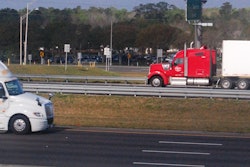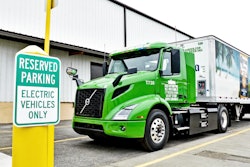The Environmental Protection Agency, in an effort to support development of potential funding programs under the Inflation Reduction Act, is asking for public input about the availability of "zero emission" vehicle (ZEV) technologies in the heavy-duty vehicle and port sectors.
The EPA last week held public hearings regarding its proposed Phase 3 greenhouse-gas regulations for heavy-duty trucks and heard from a number of commenters in the trucking and truck manufacturing industries. While many support EPA’s overall goal of reducing emissions, most noted the infrastructure to support ZEVs is not currently adequate enough to meet the Phase 3 proposal.
EPA said it “already has considerable information about the availability of certain types of [zero-emission] technologies,”, but the agency is inviting public comment so it will have “the most comprehensive and current information available.”
Specifically, EPA said it is interested in comments about the availability, market price and performance of ZEV trucks and port equipment, electric charging and other fueling infrastructure needs for such trucks in the near term (1-3 years, and 1-5 years for port equipment), and whether the components of the systems are manufactured in the United States.

[Related: 'Destined to fail': Trucking sounds off to EPA on new Phase 3 greenhouse-gas regs]
Last week, at the Advanced Clean Transportation Expo in Anaheim, California, Kenworth announced it would put into production a new hydrogen fuel cell electric (FCEV) T680 with a range of 450 miles, three times the range of the battery electric version, the eT680. Peterbilt, Paccar announced, would follow with a FCEV model in 2025. Hyundai also announced a Class 8 6x4 FCEV tractor that offers up to 450 miles of range, and several other brands announced electric medium-duty trucks.
The FCEV offerings usually boast a fueling time of just about 30 minutes, more in line with time spent at a diesel pump than at a charging depot, but the hydrogen-powered vehicles face an uphill battle when it comes to finding charging infrastructure.
EPA noted that the Build America Buy America Act (BABA) requires iron, steel, manufactured products and construction materials used in infrastructure projects funded by federal financial assistance to be produced in the United States.
“While BABA provides the opportunity for EPA to issue certain waivers to these requirements," EPA said, "approval depends on many factors, including the price and availability of domestically sourced materials and products.”
With responses to EPA’s request for comment, the agency hopes to improve its understanding of availability and differences in ZEV Class 6 and 7 trucks and ZEV trucks that serve ports and port equipment, as well as their related charging and fueling infrastructure requirements.
Comments can be filed through June 5 at www.regulations.gov by searching docket No. EPA-HQ-OAR-2023-0216.
[Related: CARB playing hardball: Board votes to ban diesel truck sales in 2036]








